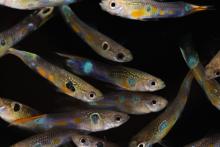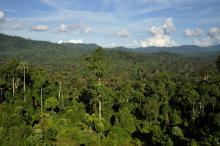Researchers from the University of British Columbia’s Project Seahorse today released the first-ever footage of a little-known seahorse species.
The video, available at www.projectseahorse.org/footage was filmed off the coast of Senegal and shows a West African seahorse being caught and released by local fishers. The animal swims away, unharmed.
The footage was taken as part of a joint investigation between Project Seahorse, Imperial College London, and the Zoological Society of London (ZSL) into West Africa’s burgeoning seahorse trade. Kate West, a graduate student at Imperial and a researcher with Project Seahorse, was travelling on a local fishing boat off the Atlantic coast when she spotted several seahorses being pulled up in a trap.
“The fishers caught two animals, and one of them I didn’t recognize at first,” says West. “After examining them, I convinced the fishers to release the seahorses back into the wild — normally they would be sold.” West followed the seahorse with an underwater camera and captured the rare footage released today.
Further study confirmed the species as Hippocampus algiricus, commonly known as the West African seahorse.
“The West African seahorse is one of two native species caught locally for export around the world,” says West. “Essentially no research has been done on this species, and nothing is known about its habitat, life cycle, or numbers.”
Project Seahorse research to date indicates that the number of West African seahorses in trade has risen dramatically over the past few years, to exports of about 600,000 seahorses annually. They are used primarily in traditional medicines.
“In recent years, the West African seahorse has become highly sought, along with many other seahorse species,” says Amanda Vincent, director of Project Seahorse and an associate professor at UBC. “Our fieldwork – the first-ever study of this species – is revealing the fishing and trade pressures they face. We will share our findings with the Senegalese and other governments so they can meet their CITES obligations and make sure their seahorse populations can be sustained.”
More information: http://www.publicaffairs.ubc.ca/2012/10/10/first-video-footage-of-unstu…
Musqueam First Nation land acknowledegement
We honour xwməθkwəy̓ əm (Musqueam) on whose ancestral, unceded territory UBC Vancouver is situated. UBC Science is committed to building meaningful relationships with Indigenous peoples so we can advance Reconciliation and ensure traditional ways of knowing enrich our teaching and research.
Learn more: Musqueam First Nation
Faculty of Science
Office of the Dean, Earth Sciences Building2178–2207 Main Mall
Vancouver, BC Canada
V6T 1Z4


